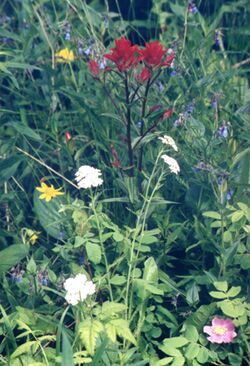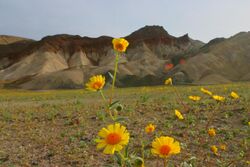Biology:Wildflower




A wildflower (or wild flower) is a flower that grows in the wild, meaning it was not intentionally seeded or planted. The term implies that the plant is neither a hybrid nor a selected cultivar that is any different from the native plant, even if it is growing where it would not naturally be found. The term can refer to the whole plant, even when not in bloom, and not just the flower.[1]
"Wildflower" is an imprecise term. More exact terms include:
- native species naturally occurring in the area (see flora)
- exotic or introduced species not native to the area, including
- invasive species that out-compete other plants, whether native or not
- imported (introduced to an area whether deliberately or accidentally)
- naturalized are imported but come to be considered by the public as native
In the United Kingdom, the organization Plantlife International instituted the "County Flowers scheme" in 2002, see County flowers of the United Kingdom for which members of the public nominated and voted for a wildflower emblem for their county. The aim was to spread awareness of the heritage of native species and about the need for conservation, as some of these species are endangered. For example, Somerset has adopted the cheddar pink (Dianthus gratianopolitanus), London the rosebay willowherb (Chamerion angustifolium) and Denbighshire/Sir Ddinbych in Wales the rare limestone woundwort (Stachys alpina).
Examples
- Adonis aestivalis, summer pheasant's-eye
- Anagallis,[2] pimpernel
- Agrostemma githago, common corn-cockle
- Alnus glutinosa, common alder
- Anthemis arvensis, corn chamomile
- Callirhoe involucrata, purple poppy-mallow
- Centaurea cyanus, cornflower
- Coreopsis tinctoria, plains coreopsis
- Dianthus barbatus, sweet William
- Digitalis purpurea, foxglove
- Dimorphotheca aurantiaca, glandular Cape marigold
- Eschscholzia californica, California poppy
- Ficaria verna, lesser celandine
- Glebionis segetum, corn marigold
- Gypsophila elegans, annual baby's-breath
- Lantana spp., shrub verbenas
- Papaver rhoeas, common poppy
- Petasites hybridus, butterbur
- Phlox drummondii, annual phlox
- Potentilla sterilis, strawberryleaf cinquefoil
- Prunus padus, bird cherry
- Silene latifolia, white campion
- Tussilago farfara, coltsfoot
- Ulmus sp., elm
- Viola riviniana, common dog-violet
- Viola tricolor, wild pansy
See also
- List of San Francisco Bay Area wildflowers
- Superbloom
- Megaherb
- Native plant
- Naturalisation
- Weed
- Escaped plant
References
- ↑ Wild flowers can be found in deserts, forests, meadows, and fields. "wildflower". http://www.merriam-webster.com/dictionary/wildflower. "Wildflower, noun. Any flowering plant that grows without intentional human aid."
- ↑ Pauline Pears (2005), HDRA encyclopedia of organic gardening, Dorling Kindersley, ISBN 978-1-4053-0891-5
External links
- Wildflower Magazine promotes the use and conservation of wildflowers and native plants, Lady Bird Johnson Wildflower Center. Formerly published by the North American Native Plant Society
- Plantlife, UK organization
- Wildflower in Cyprus Information on 1250 native plant species to North Cyprus.
- Ontario Wildflowers Detailed information about wildflowers of Ontario (Canada) and Northeastern North America
- Western USA wildflower reports
- NPIN: Native Plant Database
- Native Plant Database from the North American Native Plant Society
 |
